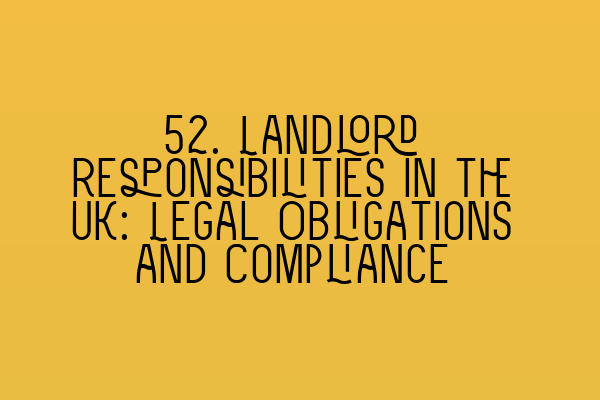Landlord Responsibilities in the UK: Legal Obligations and Compliance
Being a landlord in the UK comes with a set of legal obligations and responsibilities that must be upheld to ensure compliance with the law. As a landlord, it is important to understand these responsibilities to avoid potential legal issues and provide a safe and habitable environment for your tenants. In this article, we will explore 52 key landlord responsibilities in the UK and how to comply with them.
1. Providing a Safe Environment
The safety of your tenants should always be a top priority. You must ensure that the property meets all safety regulations, such as proper fire safety measures, gas and electrical safety standards, and secure locks on all external doors and windows. Regular inspections and maintenance should be carried out to identify any potential hazards and address them promptly.
2. Repair and Maintenance
It is your responsibility to promptly address any repairs or maintenance issues that arise in the property. This includes fixing plumbing problems, electrical faults, heating systems, and any other issues that may affect the habitability of the property. Regular inspections can help identify any maintenance needs before they become major problems.
3. Compliance with Health and Safety Regulations
As a landlord, you must comply with all health and safety regulations applicable to rental properties. This includes ensuring adequate ventilation, proper sanitation, and addressing any potential health hazards such as mold or pests. Regular inspections and necessary actions will help maintain a healthy living environment for your tenants.
4. Tenancy Agreements
It is essential to have a written tenancy agreement that clearly outlines the rights and responsibilities of both the landlord and the tenant. This agreement should cover aspects such as rent payment, maintenance responsibilities, and rules for the use of the property. By having a well-drafted tenancy agreement, you can minimize potential disputes and ensure a smooth landlord-tenant relationship.
5. Deposit Protection
If you are taking a deposit from your tenants, it is a legal requirement to protect it in a government-approved tenancy deposit scheme. This ensures that the deposit is safeguarded and can only be withheld for legally justified reasons. Failure to protect the deposit can lead to severe penalties and even prevent you from serving a valid eviction notice.
6. Right to Rent Checks
Before renting a property to a tenant, you must conduct right to rent checks to ensure that they have the legal right to live in the UK. This involves verifying the tenant’s immigration status and documents to prevent renting to individuals without the necessary authorization.
7. Energy Performance Certificate (EPC)
Prior to renting out a property, you must obtain an Energy Performance Certificate (EPC) which rates the energy efficiency of the property. Based on the rating, you may be required to make improvements to enhance the energy efficiency of the property.
8. Statutory Information
At the beginning of a tenancy, you are legally required to provide your tenants with certain statutory information. This includes the name and contact details of the landlord, details about rent payment, and information about their rights and responsibilities as tenants. Failure to provide this information can lead to legal consequences.
9. Pest Control
It is your responsibility as a landlord to address any pest infestations that may occur in the property. This includes taking necessary measures to eliminate pests and prevent future infestations. Regular inspections and prompt actions can help maintain a healthy environment for your tenants.
10. Insurance
Having appropriate insurance for your rental property is crucial. This may include landlord insurance, which covers potential damages to the property, as well as liability insurance to protect against any claims made by tenants. It is important to review your insurance policies regularly to ensure they provide adequate coverage.
Conclusion
As a landlord, it is your legal duty to comply with the various responsibilities and obligations outlined in this article. By fulfilling these obligations, you not only avoid legal issues but also create a safe and comfortable environment for your tenants. Remember to keep yourself updated with the latest regulations and seek professional advice when needed.
If you’re preparing for the SQE exams or looking for comprehensive preparation courses, check out our related articles:
